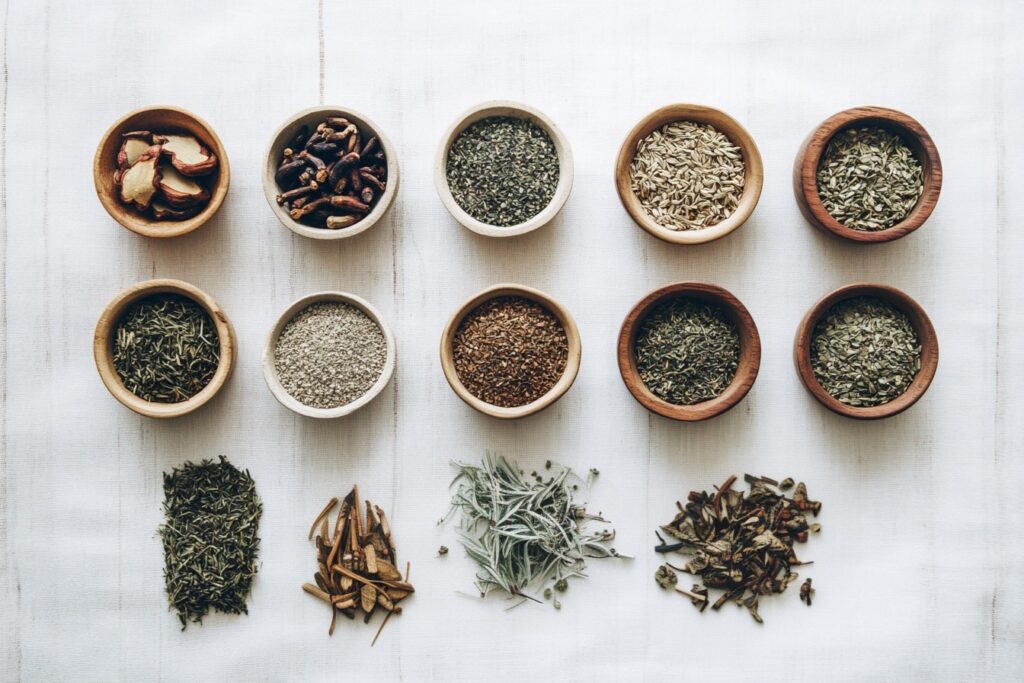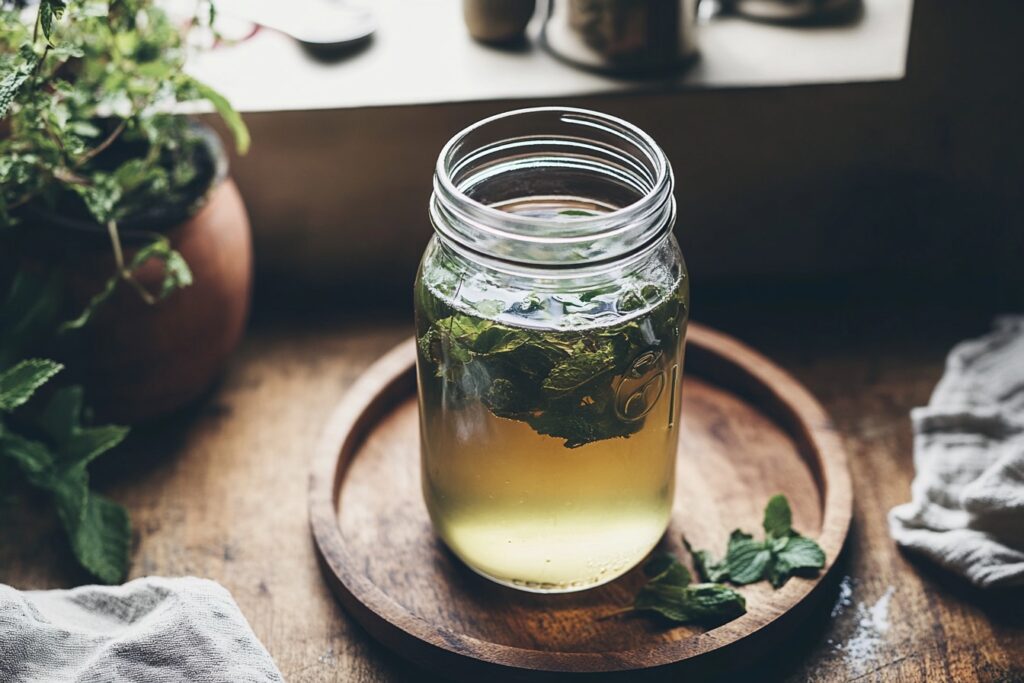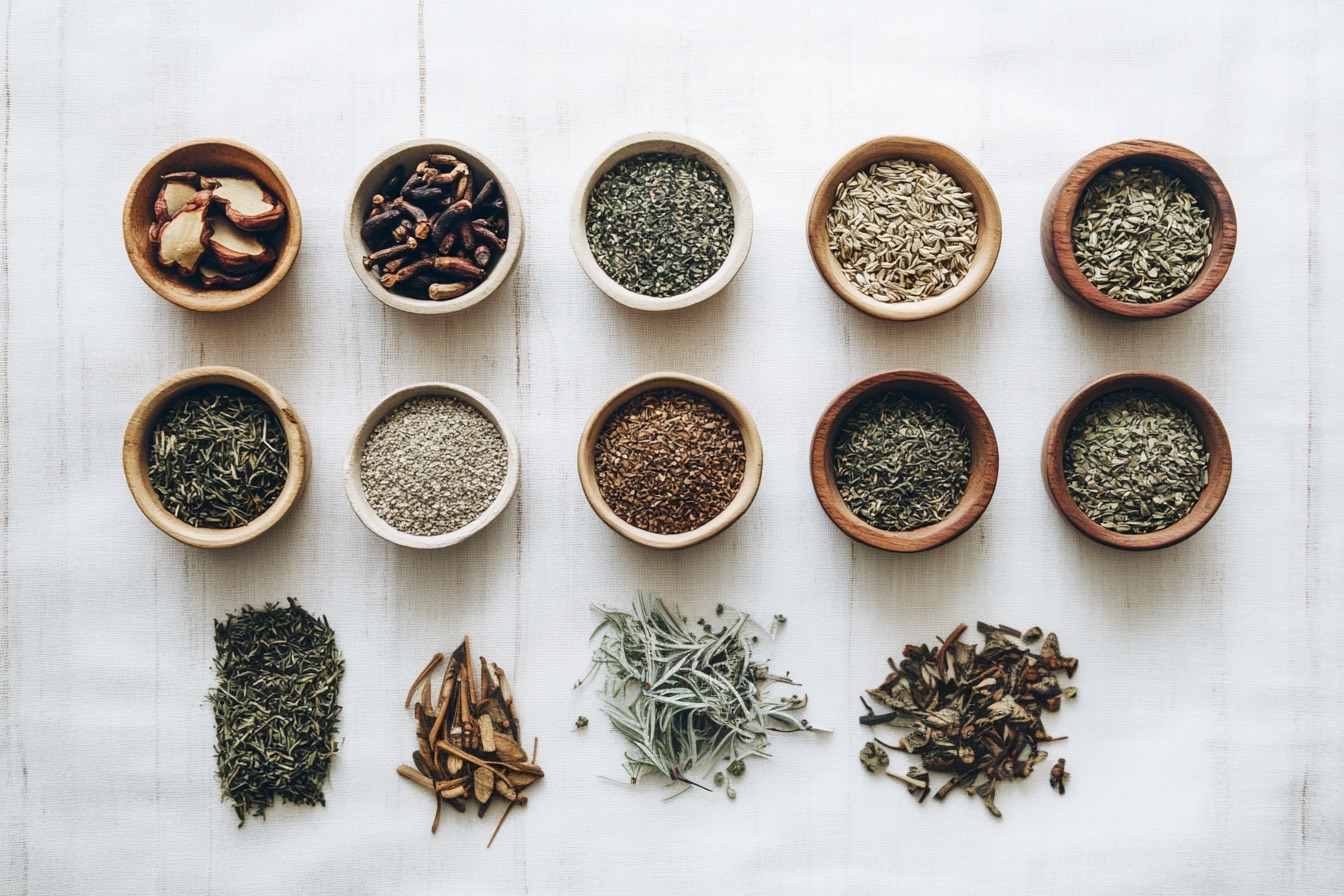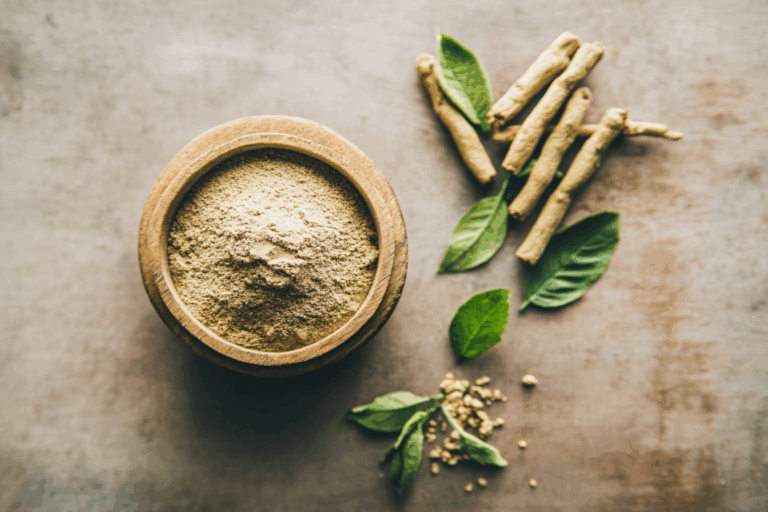
Adaptogens for stress relief offer a natural way to build resilience against daily challenges while supporting balanced energy and emotional stability. These remarkable herbs and fungi have been used in traditional medicine systems for centuries, but modern research is now validating their unique ability to help the body adapt to physical, mental, and emotional stressors.
If you’re just starting your adaptogen journey, our Cold Brew Adaptogenic Tea Guide is a great companion to this beginner-friendly overview — especially if you want to enjoy these herbs in refreshing, caffeine-free preparations.
Unlike stimulants that force energy or sedatives that suppress function, adaptogens work intelligently to normalize your body’s stress response systems, making them particularly valuable for modern stress management needs.
What Are Adaptogens and How They Support Stress Response
Adaptogens are a specific category of herbs and fungi that help the body maintain homeostasis when faced with stress. The term “adaptogen” was coined by Soviet scientist Nikolai Lazarev in 1947 to describe substances that increase the body’s resistance to stress while promoting normal physiological function.
To qualify as a true adaptogen, an herb must meet three criteria:
- It must be non-toxic in normal doses.
- It must help the body resist a wide variety of stressors.
- It must normalize physiological functions regardless of the direction of change caused by stress.
This makes adaptogens fundamentally different from other medicinal herbs that typically push the body in one specific direction.
Examples include ashwagandha, reishi mushroom, rhodiola, tulsi (holy basil), and schisandra berry — each offering unique benefits for different aspects of stress response and recovery. If you’re curious about ashwagandha specifically, try our Cold Brew Ashwagandha Tea for Stress Relief & Cortisol Balance for a gentle introduction.
How Adaptogens Work with Your Body’s Stress Systems
Understanding how adaptogens work helps explain their remarkable versatility in supporting stress resilience. These herbs influence multiple interconnected body systems simultaneously, creating comprehensive support rather than targeting isolated symptoms.
The Role of Adaptogens for Stress Relief
HPA Axis Modulation – Adaptogens interact with the hypothalamic-pituitary-adrenal axis, the body’s primary stress response system, helping regulate cortisol and adrenaline output for more balanced daily rhythms.
Nervous System Support – They promote calm alertness by supporting both sympathetic and parasympathetic nervous system function, allowing for appropriate stress responses without chronic activation.
Cellular Protection – Many adaptogens protect mitochondria from oxidative stress, helping maintain energy production and recovery capacity during challenging periods.
Immune System Balance – Adaptogens help modulate immune function, supporting resilience without overstimulation or suppression.
Some adaptogens — like hibiscus and tulsi — are even more enjoyable when cold brewed, as detailed in our Cooling Hibiscus + Tulsi Cold Brew Tea for Summer Stress Relief.
Choosing Adaptogens for Different Stress Patterns

Calming Adaptogens for Overstimulation
These are ideal for individuals experiencing anxiety, hypervigilance, or difficulty winding down from daily stressors.
- Reishi Mushroom – Supports evening nervous system recovery and emotional regulation without sedation, making it ideal for unwinding after busy days. See how we use it in our Reishi Mushroom Cold Brew for Evening Nervous System Recovery.
- Lemon Balm – A gentle nervine adaptogen that helps modulate afternoon cortisol spikes. Try our Lemon Balm Cold Brew Tea for Afternoon Cortisol Support to experience its cooling benefits.
- Tulsi (Holy Basil) – Offers parasympathetic support with natural cooling properties, particularly beneficial during warm weather.
Using Adaptogens for Stress Relief
Energizing Adaptogens for Fatigue
These herbs provide sustained energy support for those experiencing low motivation, brain fog, or chronic fatigue.
- Rhodiola – Enhances mental clarity and physical endurance, especially for short-term performance demands.
- Schisandra Berry – Supports liver function and mental focus while providing gentle, non-stimulating energy.
- Eleuthero – Builds long-term stamina and resilience, particularly after burnout.
Balancing Adaptogens for General Support
These versatile herbs provide gentle regulation suitable for most people.
- Ashwagandha – Perhaps the most researched adaptogen, supporting cortisol regulation, sleep quality, and overall resilience. For more information, read our Ashwagandha Herb Profile.
Adaptogen Benefits for Modern Stress Management
Adaptogens offer a range of science-backed benefits:
- Cortisol Regulation – Helping normalize daily rhythms without disrupting essential stress responses.
- Sustained Energy – Supporting energy production without the spikes and crashes of caffeine.
- Cognitive Clarity – Maintaining mental sharpness under pressure.
- Emotional Resilience – Encouraging healthy stress response patterns.
- Faster Recovery – Supporting cellular repair and reducing post-stress fatigue.
For a practical guide to selecting the best herbs for your needs, see How to Choose High-Quality Adaptogenic Herbs.
Are Adaptogens Safe?
For most healthy adults, adaptogens are remarkably safe when used appropriately. True adaptogens are non-toxic in normal therapeutic doses and have been used safely for centuries.
However, pregnant or breastfeeding women should avoid most adaptogens, and those with autoimmune conditions or certain prescriptions should consult a healthcare provider before use.
Are Adaptogens Safe for Pregnancy?
The safety of adaptogens during pregnancy is not well established, as most herbs in this category have not been studied extensively in pregnant populations. Traditional medicine systems sometimes use certain adaptogens, but modern medical guidelines generally recommend avoiding them during pregnancy and breastfeeding unless prescribed by a qualified healthcare provider.
Some adaptogens — such as ashwagandha and rhodiola — may influence hormone balance or uterine activity, which could be a concern during pregnancy. Others, like reishi mushroom, have limited safety data but are still avoided as a precaution.
If you are pregnant, breastfeeding, or planning to conceive, it’s important to:
- Consult your healthcare provider before taking any adaptogenic herb or supplement.
- Focus on gentle, food-based sources of nourishment and stress relief, such as herbal teas considered safe for pregnancy (e.g., chamomile in moderation, nettle leaf).
- Avoid high-concentration extracts or powders unless medically supervised.
For more details on individual adaptogens, see our ashwagandha herbal profile, reishi mushroom herbal profile, and tulsi herbal profile.
This information is for educational purposes only and is not a substitute for professional medical advice. Please see our Medical Disclaimer for full details.

Getting Started with Your First Adaptogen
- Choose Based on Your Primary Need – Calm, energize, or balance.
- Start Low and Go Slow – Begin with a small dose and increase gradually.
- Stay Consistent – Most adaptogens require 2–6 weeks for full effects.
- Track Your Response – Monitor changes in sleep, energy, and mood.
- Experiment with Preparation – Cold brewing is a gentle, flavorful method (see Combining Adaptogens for Nervous System Support for blend ideas).
FAQ
How long do adaptogens take to work for anxiety and stress relief?
Some adaptogens, like rhodiola, may provide noticeable effects within hours to days. However, most require consistent daily use for 2–6 weeks to fully optimize your body’s stress response and deliver benefits such as balanced energy, improved mood, and better sleep quality.
Can I combine different adaptogens together?
Yes — combining adaptogens can create synergistic benefits. That said, start with one adaptogen to observe your personal response, then add others gradually. Our Combining Adaptogens for Nervous System Support guide explains safe pairing strategies and dosage tips.
Should you cycle adaptogens for best results?
Taking periodic breaks (or “cycling”) can help maintain adaptogen effectiveness over time. Popular patterns include 5 days on/2 days off or rotating herbs every 4–6 weeks. Cycling is particularly helpful if your stress patterns change seasonally.
Are adaptogens safe for pregnancy or breastfeeding?
Most adaptogens have not been thoroughly studied for safety during pregnancy or breastfeeding. Herbs like ashwagandha, rhodiola, and schisandra are generally not recommended for these life stages. Always consult a qualified healthcare provider before use. See our How to Choose High-Quality Adaptogenic Herbs guide for safe sourcing tips.
What’s the best time of day to take adaptogens?
Timing depends on the herb and your personal goals. Energizing adaptogens like rhodiola are best taken in the morning or early afternoon, while calming adaptogens like reishi or lemon balm work well in the evening. If you’re using cold brew recipes, our Cold Brew Adaptogenic Tea Guide outlines ideal timing for each blend.
Can adaptogens be taken with coffee or other caffeinated drinks?
Yes, but be mindful of potential overstimulation, especially with energizing adaptogens. For a gentler energy boost, try replacing your second cup of coffee with a caffeine-free blend like Cold Brew Ashwagandha Tea for Stress Relief & Cortisol Balance.
Do adaptogens really work for anxiety and stress?
When used consistently, many adaptogens help regulate cortisol levels, support nervous system balance, and improve resilience to daily stressors. Results vary by individual and herb choice, which is why starting with a single adaptogen matched to your stress pattern is most effective.
Summary
Adaptogens offer a flexible, natural approach to stress management by working with — not against — your body’s natural processes. Whether you want calming, energizing, or balancing effects, there’s an adaptogen that fits your needs, and delicious cold brew methods make it easy to enjoy them daily.


